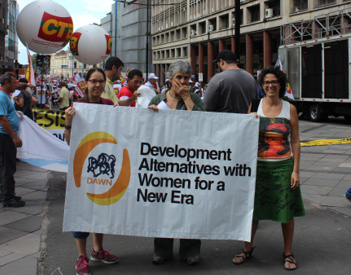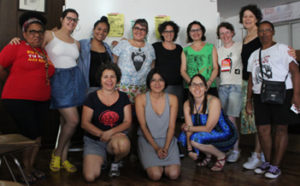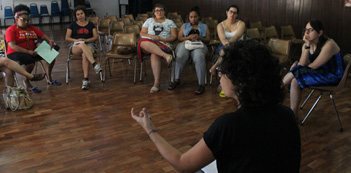
Celita Eccher (Uruguay) is a DAWN Board member and has been part of the International Council of World Social Forum since its very beginning.
Florencia Partenio (Argentina) is a member of DAWN’s Executive Committee . Flora’s work interests include: labor studies, industrial relations and job skills. She is an alumna of DAWN’s Latin American Gender, Ecological, and Economic Justice training course held in Montevideo in 2011.
The World Social Forum (WSF) was born in 2001 in Porto Alegre, in opposition to the Davos World Economic Forum. With echoes in local, national, regional and thematic forums, the WSF quickly became a space for articulation and learning, marked by horizontal, self-managed processes to exchange experiences on global militancy and activism.
DAWN participated in the construction of this space from its start. We walked through the agendas, proposing new spaces for dialogue and questioning when patriarchal relations were being reproduced within the movement and within the organization of the Forum. As Gina Vargas said, “feminists arrived at the WSF seeking to democratize gender relations, while fueling at the same time, the struggle against racism and homophobia […] for symbolic and cultural transformations” (2016: 25) and for social, gender, economic and ecologic justice.
With the idea of generating new debate with social movements, DAWN organized a self-managed workshop in the Canada WSF (the first one ever in the Global North) in August 2016. In Montreal, our proposal as DAWN feminists was to reflect on the fragility of our democracies and rupture of social contracts, which is evident in different parts of this fierce world.
The 2017 Social Forum of the Resistances in Porto Alegre, a follow-up to Montreal, took place in a moment in which the world increases day by day its ferocity, marked by an uncontrolled neoliberal globalization; a political economy militarized under a process of financialization; with crises in climate, food security, the organization of care and energy; the weakness of the nation state and strengthening of the media-corporate power and of national elites. Indeed, from Montreal to Porto Alegre, the world has become even more fierce, with the news about the US elections results, the right and extreme right making progress in different parts of the world, and particularly in Brazil about Dilma’s impeachment.

With over 3,000 people on the streets, the Social Forum of the Resistances started 5 days of intense exchange among traditional activists, afro-descendants, indigenous, youth, and women’s organizations, together with prominent urban social movements, standing up against private appropriation of public space, the loss of rights and conquest of the workers, and criminalization of social movements.
This forum marks an inflexion in the process. We believe the reflections in the collective document, “The world seen from below”, presented by a group coordinated by Pierre Beaudet of the Intercoll Network, reflects well the environment and discussions. They can be summarized by the slogan, “1000 struggles, 1000 challenges, redefining our convergences, reinventing our tools”.
Confronting the neoliberal offensive, and acknowledging the need to learn from past mistakes, the sessions on the international situation1 discussed how to re-learn from experience through clear and realistic analysis that would allow clarity to pick up the struggles, the resistance and the organization in front of a crisis of civilization. In Latin America’s case, this re-learning is connected to an examination of the ‘lefts’, the outstanding debts of the “progressive” governments concerning real democratization, the revision of personality-based leaderships, and the limitations they imply.
At the same time, re-learning from experience also implies rethinking the space of the WSF itself. We concur with the intellectual and member of the WSF International Council, Gustave Massiah (2016), that in a global context of reaffirmation of policies of austerity and structural adjustment, the social forums find themselves in a bind. We need to relocate them in the movement against neoliberal globalization and as a historical movement of emancipation. Following that line of argument, we believe that the challenge still relies on the new articulations built by the social, cultural, students’, peasant-indigenous, workers’, LGBT and feminist movements. With this in mind, it is most important that we have a clear vision for how to deal with the difficulties that obstruct solidarity, and to define strategies that foresee “another possible world”, here and now.
To analyze the necessary ruptures that lead to an ecological, social and democratic transition, Massiah (2017) recover the five revolutions that are taking place, unfinished and filled with uncertainties. Those revolutions are: the rights of the people fighting for decolonization and self-determination; the ecological revolution; the digital and Internet revolution, because it changes the work with the written word and language in general; the revolution of the people for migration and the growth of the refugees. The fifth is the revolution for women’s rights and everything that the overthrow of patriarchy means, and the strategic importance of diversity brought by that movement, which has been central within the WSF. This revolution has questioned the social movements themselves, insisting on the fact that women’s fight is not a secondary contradiction and cannot be subordinated.
From this perspective, in the Porto Alegre forum, DAWN organized a workshop on the feminist challenges in the context of the resistances. We debated on the different forms of social injustice, their interlinkages, and the responses from the feminist and women’s movement – and from other social movements – to resist and overcome the overwhelming forces of globalization that threaten our victories. Women from unions, ecumenical groups, feminist movements, lesbians, teachers and students, women workers and afro-descendants organizations, discussed from a needed feminist perspective, the processes that weaken our democracies (such as the effects of the misogynist and patriarchal coup against Dilma Rousseff’s government; the increase of religious fundamentalism in schools, such as the movement for ‘schools without political parties’ in Brazil, etc.). But we also discussed the limitations shown by the Left when it comes to incorporating feminist perspectives on participation, alliances, the occupation of spaces and in their organization itself.
As was said in different workshops, “to resist is to fight”; resisting is “a way of starting over”. In that path, feminisms from the global South have a leading role both in the analysis of the international situation, as well as in the contributions to the making of an alternative project.
The revolution will be feminist or it won’t be at all. This revolution is unfinished and filled with riches built from the same path that feminisms have traced. We, women, walk towards an international strike on March 8. That fight has a lot to teach us about the discussions and experiences in contexts of resistance. Feminisms show themselves, once again, as a beacon of hope.
Bibliographic references:
- Beaudet, Pierre (coord.) (2016) The world seen from below. Draft report for the International Council of the WSF, Montreal, December.
- Massiah, Gustave (2016) “Os Foruns sociais mundiais na encruzilhada”, en Coletivo FSM Brazil 2016 (org.) 15 anos de Forum Social Mundial.
- Balanços, desafíos e perspectivas da luta por outro mundo possivel.
- Massiah Gustave (2017) “Seminario sobre cojuntura internacional”, Forum Social das resistencias, 18 de janeiro, Porto Alegre.
- Vargas, Gina (2016) “Reflexoes dobre o FSM”, en Coletivo FSM Brazil 2016 (org.) 15 anos de Forum Social Mundial. Balanços, desafíos e perspectivas da luta por outro mundo possivel.
1 See more at: http://forumsocialportoalegre.org.br/2017/01/19/conjuntura-internacional-na-pauta-do-forum-social-das-resistencias/
